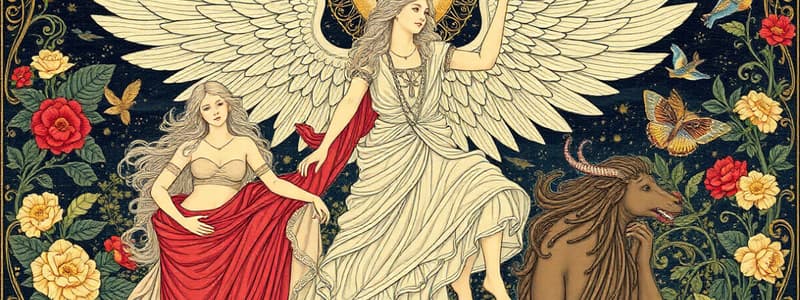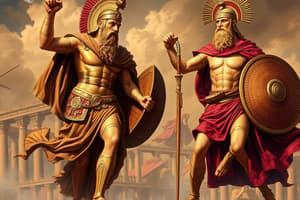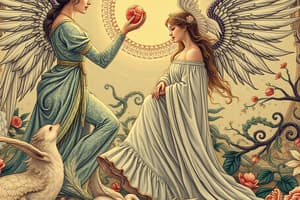Podcast
Questions and Answers
Match the characters with their corresponding themes:
Match the characters with their corresponding themes:
Aiolos = Divine assistance and human flaws Andromache = Human cost of war Antikleia = Longing and separation Orestes = Cycle of vengeance
Match the characters to their story origins:
Match the characters to their story origins:
Aiolos = The Odyssey Andromache = The Iliad Antikleia = The Odyssey Orestes = The Iliad
Match the character with their familial relationships:
Match the character with their familial relationships:
Aiolos = None Andromache = Wife of Hektor Antikleia = Mother of Odysseus Orestes = Son of Agamemnon
Match the characters to their significant actions:
Match the characters to their significant actions:
Match the characters to the narrative elements they highlight:
Match the characters to the narrative elements they highlight:
Match the characters to their respective literary roles:
Match the characters to their respective literary roles:
Match the character's fate or outcome:
Match the character's fate or outcome:
Match the characters with the moral dilemmas they represent:
Match the characters with the moral dilemmas they represent:
Match the characters with the specific sections of the epics they are found in:
Match the characters with the specific sections of the epics they are found in:
Match the following characters with their roles or themes in the Iliad and the Odyssey:
Match the following characters with their roles or themes in the Iliad and the Odyssey:
Match the following aspects with the corresponding character from the content:
Match the following aspects with the corresponding character from the content:
Match the following pairs to their significance in the epics:
Match the following pairs to their significance in the epics:
Match the following characters to their associated themes:
Match the following characters to their associated themes:
Match the skill or action with the correct Olympian god:
Match the skill or action with the correct Olympian god:
Match each character with their involvement in the Trojan War:
Match each character with their involvement in the Trojan War:
Match the following characters to their notable qualities:
Match the following characters to their notable qualities:
Match the following divine influences with their effects in the narratives:
Match the following divine influences with their effects in the narratives:
Match each character from the epics to their associated actions:
Match each character from the epics to their associated actions:
Match the following characters with their roles in the epics:
Match the following characters with their roles in the epics:
Match the following themes with their corresponding character or element:
Match the following themes with their corresponding character or element:
Match the characters with their impact on the narratives:
Match the characters with their impact on the narratives:
Match the moments with the corresponding character's involvement:
Match the moments with the corresponding character's involvement:
Match the epics with their key themes associated with the characters:
Match the epics with their key themes associated with the characters:
Match the character with their specific qualities:
Match the character with their specific qualities:
Match the narrative elements with their meanings:
Match the narrative elements with their meanings:
Match the following actions with their respective character's associations:
Match the following actions with their respective character's associations:
Match the following elements to the qualities they represent:
Match the following elements to the qualities they represent:
Match the following Greek rituals with their descriptions:
Match the following Greek rituals with their descriptions:
Match the following figures or locations with their significance in Greek mythology:
Match the following figures or locations with their significance in Greek mythology:
Match the following concepts of xenia with their implications:
Match the following concepts of xenia with their implications:
Match the following elements of the Iliad and Odyssey with their characteristics:
Match the following elements of the Iliad and Odyssey with their characteristics:
Match the following ancient Greek rituals with their outcomes:
Match the following ancient Greek rituals with their outcomes:
Match the following myths or legends with their related aspects:
Match the following myths or legends with their related aspects:
Match the following characters with their roles in the narrative:
Match the following characters with their roles in the narrative:
Match the following themes with their corresponding characters:
Match the following themes with their corresponding characters:
Match the following characters with their significant actions:
Match the following characters with their significant actions:
Match the following characters with their relationships to Odysseus:
Match the following characters with their relationships to Odysseus:
Match the following characters with the epics they are featured in:
Match the following characters with the epics they are featured in:
Match the following characters with their symbolic significance:
Match the following characters with their symbolic significance:
Match the following characters with their reasons for actions:
Match the following characters with their reasons for actions:
Match the following characters with their narrative contributions:
Match the following characters with their narrative contributions:
Match the following characters with the qualities they embody:
Match the following characters with the qualities they embody:
Match the following characters with the lessons they represent:
Match the following characters with the lessons they represent:
Flashcards are hidden until you start studying
Study Notes
Aiolos
- God of the winds
- Resides on floating island of Aeolia
- Gives Odysseus a bag of unfavorable winds to help him sail home
- Odysseus' crew opens the bag out of curiosity and greed, releasing the winds and delaying their journey
- Represents the theme of divine assistance and the fragility of human endeavors
Andromache
- Wife of Hektor, the Trojan prince
- Embodies the human cost of war
- Portrayed as a loving wife who fears for Hektor's safety and her family's future
- Demonstrates the emotional toll of war on families and the bonds of love and loyalty amidst conflict
Antikleia
- Odysseus' mother
- Appeared to Odysseus in the Underworld
- Her presence highlights themes of longing and the impact of war on personal relationships
- Shows the toll Odysseus' journey has taken on those he left behind, including her grief over his absence
Aphrodite
- Goddess of love and beauty
- Plays a significant role in the Trojan War
- Awarded the title of fairest goddess by Paris, leading to the Trojan War
- Actively supports the Trojans, using her divine powers to protect and aid them in battle
- Represents the complexities of love, desire, and human relationships
Apollo
- One of the major Olympian gods
- Supports the Trojans and is often depicted as a fierce protector of their interests
- Apollo's involvement in the Trojan War emphasizes the theme of divine influence in human affairs
- Associated in the Odyssey with prophecy, music, and the arts, and his guidance is invoked by various characters
Ares
- Greek god of war
- Intervenes in key moments of both the Iliad and the Odyssey, often siding with the Greeks
- Embodies the ideal qualities of a warrior, combining intelligence and skill with compassion
Athena
- Greek goddess of wisdom, war, and crafts
- Serves as Odysseus' protector and mentor in the Odyssey
- Her guidance emphasizes the importance of cleverness and strategy over brute force
Briseis
- A captive woman awarded to Achilles as a war prize
- Her abduction by Agamemnon is the catalyst for Achilles' wrath and withdrawal from battle
- Represents the consequences of pride and honor among the Greek warriors
Charybdis
- A monstrous sea creature
- Creates treacherous waters that threaten to swallow ships whole
- Symbolic of the unpredictable nature of fate and the dangers inherent in Odysseus' quest for homecoming
Penelope
- Odysseus' wife
- Remains faithful to Odysseus throughout his long absence
- Her intelligence and cleverness contribute to Odysseus' return, underscoring the importance of home
Phaiakians
- Inhabitants of the island of Scheria
- Known for their exceptional seafaring skills, hospitality, and connection to the gods
- Welcome Odysseus warmly after his shipwreck, demonstrating exemplary xenia
- Their assistance highlights themes of generosity, the importance of hospitality, and divine favour.
Poseidon
- God of the sea
- Supports the Greeks in the Iliad, often intervening in battles
- Serves as the primary divine antagonist to Odysseus in the Odyssey
- His wrath against Odysseus reflects the unpredictable dangers of the sea
Priam
- Aged king of Troy
- Portrayed as a compassionate and wise ruler who deeply mourns the losses his city endures during the war
- His most significant role occurs when he pleads with Achilles for the return of Hector's body
Xenia
- The Greek concept of hospitality
- The Phaiakians exemplify xenia by treating Odysseus with utmost respect
Rituals to communicate with the gods
- Sacrifice: Offering animals to gods at altars
- Divination: Seeking knowledge about the future or the will of the gods through interpreting signs from nature
- Festivals: Celebrated to showcase devotion to the gods through collective worship and celebration
Iliad and the Odyssey as composite texts
- The Iliad and the Odyssey were likely shaped by oral tradition before being committed to writing
- Their narratives evolved over time, leading to their categorization as 'composite' texts
Studying That Suits You
Use AI to generate personalized quizzes and flashcards to suit your learning preferences.




